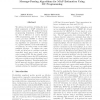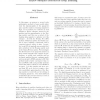134
click to vote
JMLR
2012
13 years 4 months ago
2012
Many real-world problems are inherently hierarchically structured. The use of this structure in an agent’s policy may well be the key to improved scalability and higher performa...
162
click to vote
JMLR
2012
13 years 4 months ago
2012
In recent years there has been a lot of interest in designing principled classification algorithms over multiple cues, based on the intuitive notion that using more features shou...
156
click to vote
JMLR
2012
13 years 4 months ago
2012
We address the problem of finding the most likely assignment or MAP estimation in a Markov random field. We analyze the linear programming formulation of MAP through the lens of...
176
click to vote
JMLR
2012
13 years 4 months ago
2012
This paper presents new and effective algorithms for learning kernels. In particular, as shown by our empirical results, these algorithms consistently outperform the so-called uni...
142
click to vote
JMLR
2012
13 years 4 months ago
2012
We show that the stick-breaking construction of the beta process due to Paisley et al. (2010) can be obtained from the characterization of the beta process as a Poisson process. S...
146
click to vote
JMLR
2012
13 years 4 months ago
2012
In this paper, we propose to apply sparse canonical correlation analysis (sparse CCA) to an important genome-wide association study problem, eQTL mapping. Existing sparse CCA mode...
133
Voted
JMLR
2012
13 years 4 months ago
2012
The main theme of this paper is to develop a novel eigenvalue optimization framework for learning a Mahalanobis metric. Within this context, we introduce a novel metric learning a...
126
click to vote
JMLR
2012
13 years 4 months ago
2012
We consider a model for which it is important, early in processing, to estimate some variables with high precision, but perhaps at relatively low recall. If some variables can be ...
139
click to vote
JMLR
2012
13 years 4 months ago
2012
In this paper, we propose a second order optimization method to learn models where both the dimensionality of the parameter space and the number of training samples is high. In ou...
144
click to vote
JMLR
2012
13 years 4 months ago
2012
Grid search and manual search are the most widely used strategies for hyper-parameter optimization. This paper shows empirically and theoretically that randomly chosen trials are ...


